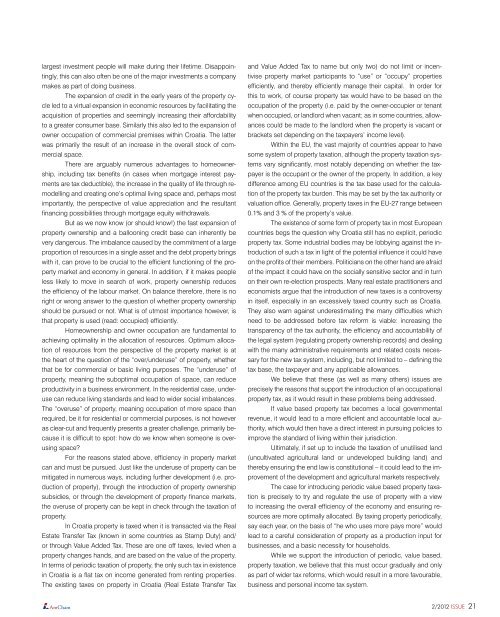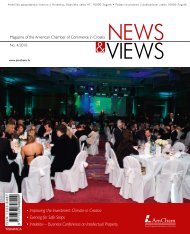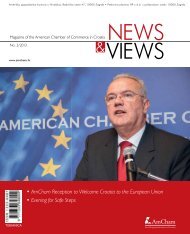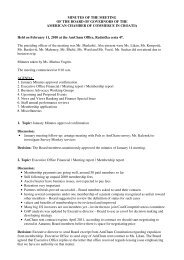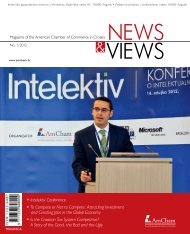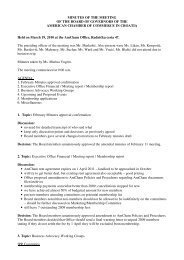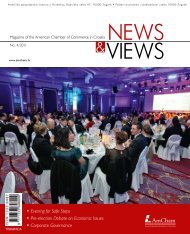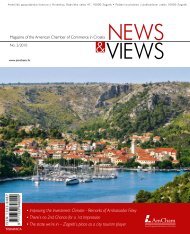Download this issue - AmCham
Download this issue - AmCham
Download this issue - AmCham
- No tags were found...
Create successful ePaper yourself
Turn your PDF publications into a flip-book with our unique Google optimized e-Paper software.
largest investment people will make during their lifetime. Disappointingly,<strong>this</strong> can also often be one of the major investments a companymakes as part of doing business.The expansion of credit in the early years of the property cycleled to a virtual expansion in economic resources by facilitating theacquisition of properties and seemingly increasing their affordabilityto a greater consumer base. Similarly <strong>this</strong> also led to the expansion ofowner occupation of commercial premises within Croatia. The latterwas primarily the result of an increase in the overall stock of commercialspace.There are arguably numerous advantages to homeownership,including tax benefits (in cases when mortgage interest paymentsare tax deductible), the increase in the quality of life through remodellingand creating one’s optimal living space and, perhaps mostimportantly, the perspective of value appreciation and the resultantfinancing possibilities through mortgage equity withdrawals.But as we now know (or should know!) the fast expansion ofproperty ownership and a ballooning credit base can inherently bevery dangerous. The imbalance caused by the commitment of a largeproportion of resources in a single asset and the debt property bringswith it, can prove to be crucial to the efficient functioning of the propertymarket and economy in general. In addition, if it makes peopleless likely to move in search of work, property ownership reducesthe efficiency of the labour market. On balance therefore, there is noright or wrong answer to the question of whether property ownershipshould be pursued or not. What is of utmost importance however, isthat property is used (read: occupied) efficiently.Homeownership and owner occupation are fundamental toachieving optimality in the allocation of resources. Optimum allocationof resources from the perspective of the property market is atthe heart of the question of the “over/underuse” of property, whetherthat be for commercial or basic living purposes. The “underuse” ofproperty, meaning the suboptimal occupation of space, can reduceproductivity in a business environment. In the residential case, underusecan reduce living standards and lead to wider social imbalances.The “overuse” of property, meaning occupation of more space thanrequired, be it for residential or commercial purposes, is not howeveras clear-cut and frequently presents a greater challenge, primarily becauseit is difficult to spot: how do we know when someone is overusingspace?For the reasons stated above, efficiency in property marketcan and must be pursued. Just like the underuse of property can bemitigated in numerous ways, including further development (i.e. productionof property), through the introduction of property ownershipsubsidies, or through the development of property finance markets,the overuse of property can be kept in check through the taxation ofproperty.In Croatia property is taxed when it is transacted via the RealEstate Transfer Tax (known in some countries as Stamp Duty) and/or through Value Added Tax. These are one off taxes, levied when aproperty changes hands, and are based on the value of the property.In terms of periodic taxation of property, the only such tax in existencein Croatia is a flat tax on income generated from renting properties.The existing taxes on property in Croatia (Real Estate Transfer Taxand Value Added Tax to name but only two) do not limit or incentiviseproperty market participants to “use” or “occupy” propertiesefficiently, and thereby efficiently manage their capital. In order for<strong>this</strong> to work, of course property tax would have to be based on theoccupation of the property (i.e. paid by the owner-occupier or tenantwhen occupied, or landlord when vacant; as in some countries, allowancescould be made to the landlord when the property is vacant orbrackets set depending on the taxpayers’ income level).Within the EU, the vast majority of countries appear to havesome system of property taxation, although the property taxation systemsvary significantly, most notably depending on whether the taxpayeris the occupant or the owner of the property. In addition, a keydifference among EU countries is the tax base used for the calculationof the property tax burden. This may be set by the tax authority orvaluation office. Generally, property taxes in the EU-27 range between0.1% and 3 % of the property’s value.The existence of some form of property tax in most Europeancountries begs the question why Croatia still has no explicit, periodicproperty tax. Some industrial bodies may be lobbying against the introductionof such a tax in light of the potential influence it could haveon the profits of their members. Politicians on the other hand are afraidof the impact it could have on the socially sensitive sector and in turnon their own re-election prospects. Many real estate practitioners andeconomists argue that the introduction of new taxes is a controversyin itself, especially in an excessively taxed country such as Croatia.They also warn against underestimating the many difficulties whichneed to be addressed before tax reform is viable: increasing thetransparency of the tax authority, the efficiency and accountability ofthe legal system (regulating property ownership records) and dealingwith the many administrative requirements and related costs necessaryfor the new tax system, including, but not limited to – defining thetax base, the taxpayer and any applicable allowances.We believe that these (as well as many others) <strong>issue</strong>s areprecisely the reasons that support the introduction of an occupationalproperty tax, as it would result in these problems being addressed.If value based property tax becomes a local governmentalrevenue, it would lead to a more efficient and accountable local authority,which would then have a direct interest in pursuing policies toimprove the standard of living within their jurisdiction.Ultimately, if set up to include the taxation of unutilised land(uncultivated agricultural land or undeveloped building land) andthereby ensuring the end law is constitutional – it could lead to the improvementof the development and agricultural markets respectively.The case for introducing periodic value based property taxationis precisely to try and regulate the use of property with a viewto increasing the overall efficiency of the economy and ensuring resourcesare more optimally allocated. By taxing property periodically,say each year, on the basis of “he who uses more pays more” wouldlead to a careful consideration of property as a production input forbusinesses, and a basic necessity for households.While we support the introduction of periodic, value based,property taxation, we believe that <strong>this</strong> must occur gradually and onlyas part of wider tax reforms, which would result in a more favourable,business and personal income tax system.2/2012 ISSUE 21


